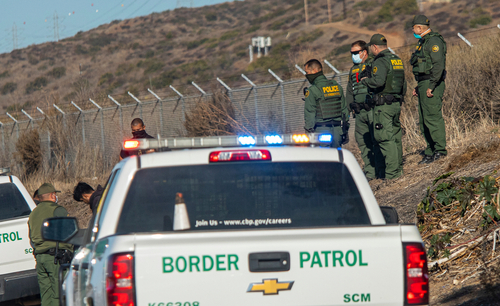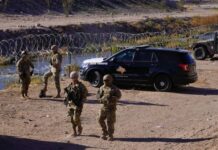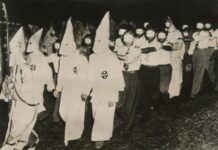
In a startling incident that underscores the challenges faced by journalists seeking to shed light on border security issues, an investigative reporter was threatened with arrest by a Border Patrol agent in Lukeville, Arizona. The confrontation occurred as the journalist was documenting illegal crossings at the port of entry, highlighting the tense atmosphere surrounding immigration enforcement in the region.
Jeff Rainforth, an experienced reporter known for his work in conflict zones, found himself in a precarious situation while filming along the border road next to the Lukeville port of entry. Despite spending nearly six hours walking and filming without any objections from other agents—who even engaged him in conversation—Rainforth was abruptly told he could be arrested for trespassing by one confrontational agent.
BREAKING: @OKeefeMedia infiltrates secret NO MAS MUERTES, @NoMoreDeaths encampment in the middle of the desert in Aravaca, Arizona near the border. Posing as donors and land surveyors, and with the help of an illegal immigrant working undercover, OMG recordings show this… pic.twitter.com/ZDIBlpdKIG
— James O'Keefe (@JamesOKeefeIII) February 14, 2024
This incident raises significant concerns about the freedom of the press and the right to document and report on matters of public interest. Rainforth had been granted permission by the National Parks Service to be on the road on foot, challenging the agent’s claim that he was trespassing. This discrepancy points to a troubling lack of clarity regarding jurisdiction and the rights of journalists in sensitive areas like the border.
Moreover, Rainforth’s encounter with the Border Patrol agent is not an isolated event but part of a broader narrative of challenges faced by those reporting on border security and immigration. In his seven weeks documenting the situation in Lukeville, Rainforth observed a range of activities, including large groups of migrants crossing through breaches in the border wall. His efforts to bring these realities to light were met with resistance, not only from the agent who threatened him but also from other elements within the border enforcement apparatus.
Every Democrat & "journalist" is saying that the border bill failed because Trump told Republicans to kill it so he could campaign on the border.
That is a lie.
Rather, this bill died because it was bad policy.
Exposing the left's lies on Verdict👇https://t.co/g5bOjSsgRz pic.twitter.com/Ne0IaFpdb5
— Ted Cruz (@tedcruz) February 7, 2024
The implications of such incidents are far-reaching. They not only hinder the ability of journalists to conduct their work but also impact the public’s right to be informed about critical issues affecting their communities and the nation. The confrontation between Rainforth and the Border Patrol agent serves as a stark reminder of the obstacles journalists face in their pursuit of truth, particularly in areas where the stakes are high, and interests are deeply entrenched.
Rainforth’s experience also sheds light on the broader context of corruption and mistrust that plagues border enforcement on both sides of the U.S.-Mexico divide. Conversations with locals and observations made during his time in Lukeville suggest that corruption may extend beyond Mexican officials to include those tasked with securing the American side of the border. Such allegations, if true, complicate efforts to address illegal crossings and undermine the integrity of border security operations.
As the debate over border security and immigration continues to rage, the treatment of journalists like Jeff Rainforth should concern all who value transparency, accountability, and the free flow of information. Without the courage and determination of reporters willing to face threats and intimidation, the public would remain in the dark about the realities of life on the border and the complexities of enforcing immigration laws.
It is imperative that journalists’ rights to document and report on these critical issues are upheld, ensuring that the pursuit of truth is not stifled by those who wish to keep it hidden.










